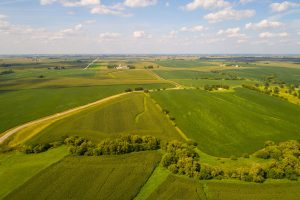American Farmland Trust has released a white paper summarizing the climate benefits associated with agricultural conservation easements.
It’s a timely paper, with global attention focused on addressing climate change on the heels of the United Nations Climate Change Conference in Dubai last December.
“Agricultural conservation easements are an essential — and too often overlooked — tool in our efforts to address climate change,” said Cris Coffin, Director of AFT’s National Agricultural Land Network and Senior Policy Advisor. “These easements help reduce greenhouse gas emissions generated from low-density development. And protecting America’s disappearing farm and ranch lands is foundational to securing broader climate gains from American agriculture.”
The white paper, entitled, Agricultural Land Protection: An Essential Tool for Fighting Climate Change, presents five ways in which agricultural conservation easements help mitigate climate change, positing that they:
- Avoid the conversion of agricultural land to developed uses with higher greenhouse gas emissions.
- Encourage greater adoption of practices that sequester carbon, reduce GHG emissions, and build climate resilience.
- Retain the benefits of conservation practices and the potential of lands to serve as a carbon sink.
- Reduce the threat of converting grasslands and more marginal land into production.
- Protect other lands associated with farms and ranches — like woods and wetlands — often providing valuable carbon sequestration.
The paper builds off of survey results — published by AFT last September — of owners whose land was protected by the federal Farm and Ranch Land Protection Program. This program is the precursor to the USDA Natural Resource Conservation Service’s current Agricultural Conservation Easement Program.
The survey showed a direct relationship between program participation and implementing “climate-smart” practices, the subset of conservation practices identified by the NRCS as delivering carbon sequestration and GHG reductions.
“We found that participation in the federal farmland protection program resulted in a so-called ‘permanence syndrome,’” said AFT Director of Farmland Information Center and Senior Advisor Jen Dempsey, who led the research effort, which was conducted in partnership with the Resources Social Science Lab at Purdue University. “Proceeds from the voluntary sale of conservation easements gave landowners money to help adopt new practices. But more than that, owners said the protected status of the land motivated them to make long-term investments and improvements to their land.”

The FRPP survey shows higher adoption rates of climate-smart practices by owners of eased land than the general farming population. For instance, 65 percent of respondents used conservation tillage, and 57 percent implemented cover crops or green manure crops. The National Agricultural Statistic Service’s 2017 Census of Agriculture of the general farming population shows 34 percent of farms using no-till or reduced tillage and 10 percent implementing cover crops.
The white paper also points to how permanently protecting agricultural land can avoid GHG emissions when coupled with Smart Growth. The State of California has taken this approach through its Sustainable Agricultural Land Conservation program, which funds agricultural conservation easements based on quantifying their potential GHG benefits. AFT is presently exploring how such an approach could be used nationally.
“To date, over 8 million farmland acres have been protected,” said Coffin. “While this is an incredible achievement, it represents less than 1 percent of our nation’s farmland. If we are to meet our climate goals and feed a growing world, we must redouble our support for agricultural conservation easement programs at all levels of government.”
Congress is currently working on the next Farm Bill, which will include opportunities to improve and strengthen ACEP, the sole federal program devoted to the purchase of agricultural conservation easements. More information on AFT’s Farm Bill farmland protection policies can be found here.


